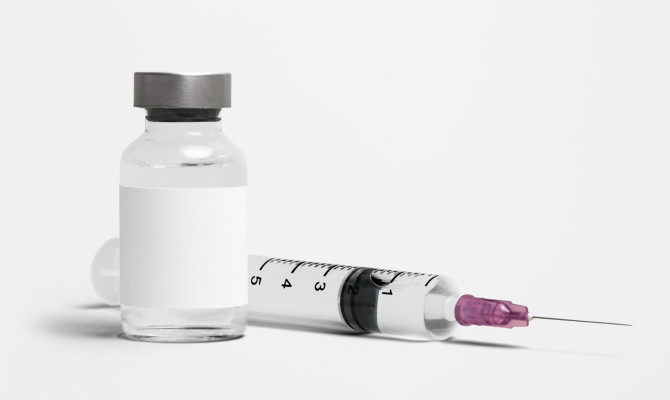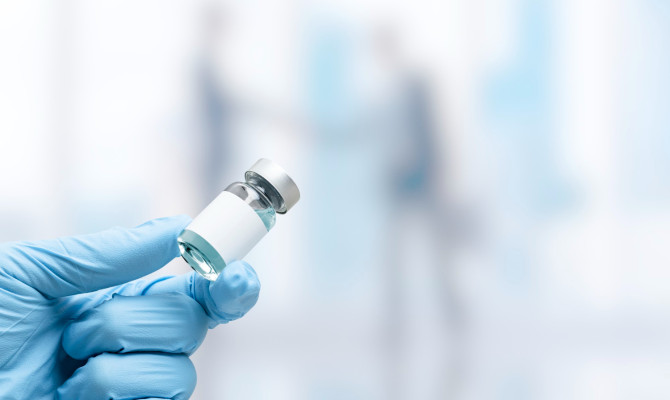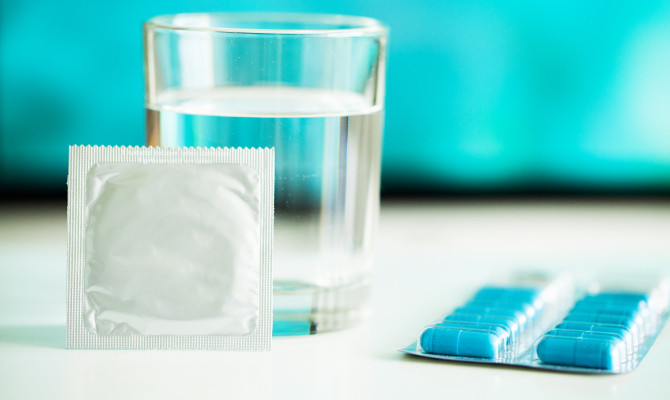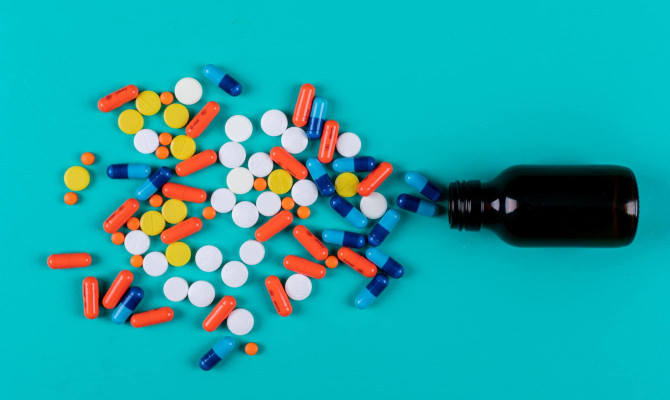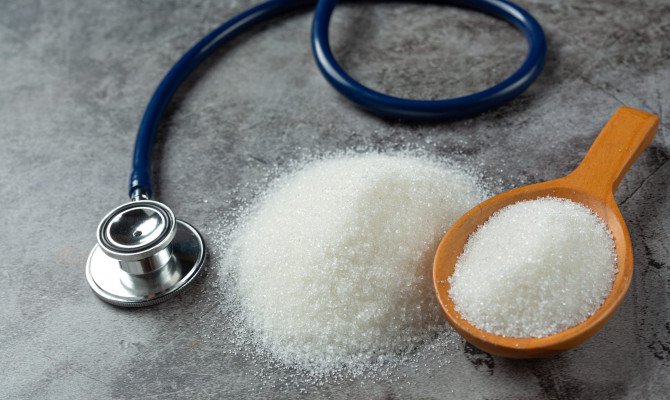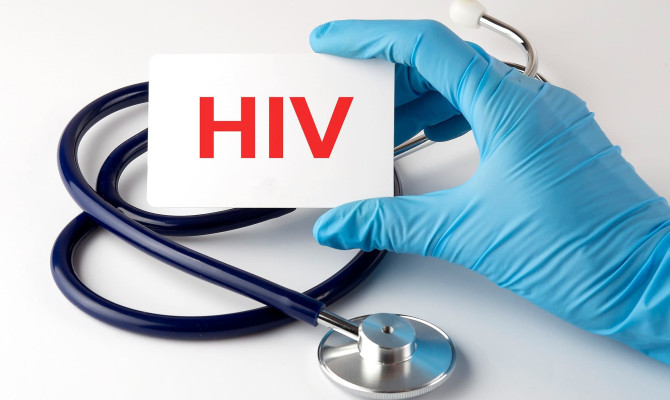Escitalopram: Uses, Dosage, Side effects and Interactions

- Escitalopram
- 22 Aug 2023
Overview
About Escitalopram
A medication called escitalopram is administered to treat and manage severe depression and anxiety disorders. It is the S-enantiomer of citalopram and the most selective SSRI, these group of drugs are now considered as the first line drugs in depression.1Overview| Researched based study from Nlm.nih.gov

Key facts about Escitalopram
- It belongs to the selective serotonin reuptake inhibitors(SSRI) class.
- In the therapy of anxiety and depression, serotonergic function is restored.
- Escitalopram is 1000 times more potent than citalopram
- Escitalopram may boost your mood, make you feel better, and lessen your anxiety.
- Escitalopram is also employed for the treatment of other disorders of mood like OCD (obsessive-compulsive disorder, panic disorder) and hot flashes that are seen following menopause.
- The Brand names given to it is Lexapro.
How does it work
Escitalopram is a member of the SSRI (selective serotonin reuptake inhibitor)which comes under a group of antidepressants.
- These medications raise the concentration of serotonin in the brain, a neurotransmitter that lifts up your mood.
- The sodium-dependent serotonin transporter protein (SERT), is where SSRIs work by exerting their therapeutic effects.
- SERT functions through reabsorption of serotonin into the presynaptic neuron.
- Escitalopram blocks the SERT thus increasing the amounts of serotonin left in the synaptic cleft.
- Serotonin regulates a variety of human behavioral processes, such as mood, memory, cognition, rage, hostility, anxiousness, stress response, hunger, addiction, and sexuality.1Overview| Researched based study from Nlm.nih.gov
Uses
Escitalopram uses
- Escitalopram has been given FDA approval to treat unipolar major depression in adults and adolescents (13 to 19 years old) both acutely and continuously.
- It is also used to treat people with GAD (generalized anxiety disorder) and panic disorders.
- Escitalopram is used off-label for OCD’s(obsessively compulsive disorder), premenstrual dysphoric disorder, panic disorders, PTSD(post traumatic stress disorder), and social anxieties.
- Migraine, attention deficit hyperactivity disorder(ADHD), urinary stress incontinence.
- These are also tried in nocturnal enuresis, when other measures fail.2Uses| Researched based study from Medicines.org
Dosage
Escitalopram Dosage
- Escitalopram is available in both tablet and oral solution
- Tablets are available in 5,10,15mg and oral solution at 5mg/ml
- Brand name: Lexapro
How to take Escitalopram?
Escitalopram has both tablet and a solution (liquid) form available. It is ingested one time in a day and can be taken with or without food.
- Escitalopram can be started with low dose to begin with and then the dose can be tapered gradually after a week.
- It may take one to four weeks or longer before you start to benefit fully from escitalopram.
- Regardless of how well you feel, you should still take escitalopram.
- Do not stop taking your escitalopram medications without first talking to your doctor.
- Your doctor will probably slowly reduce your dose.
- Escitalopram withdrawal symptoms include irritability, agitation, mood changes, nausea, vomiting, dizziness, numbness or tingling in the hands or feet, disorientation, headache, and difficulty falling asleep.
- Tell your doctor straight away if you have any of the aforementioned symptoms when lowering your escitalopram dosage or right away after quitting the drug.3Dosage| Researched based study from Medlineplus.gov
Side effects
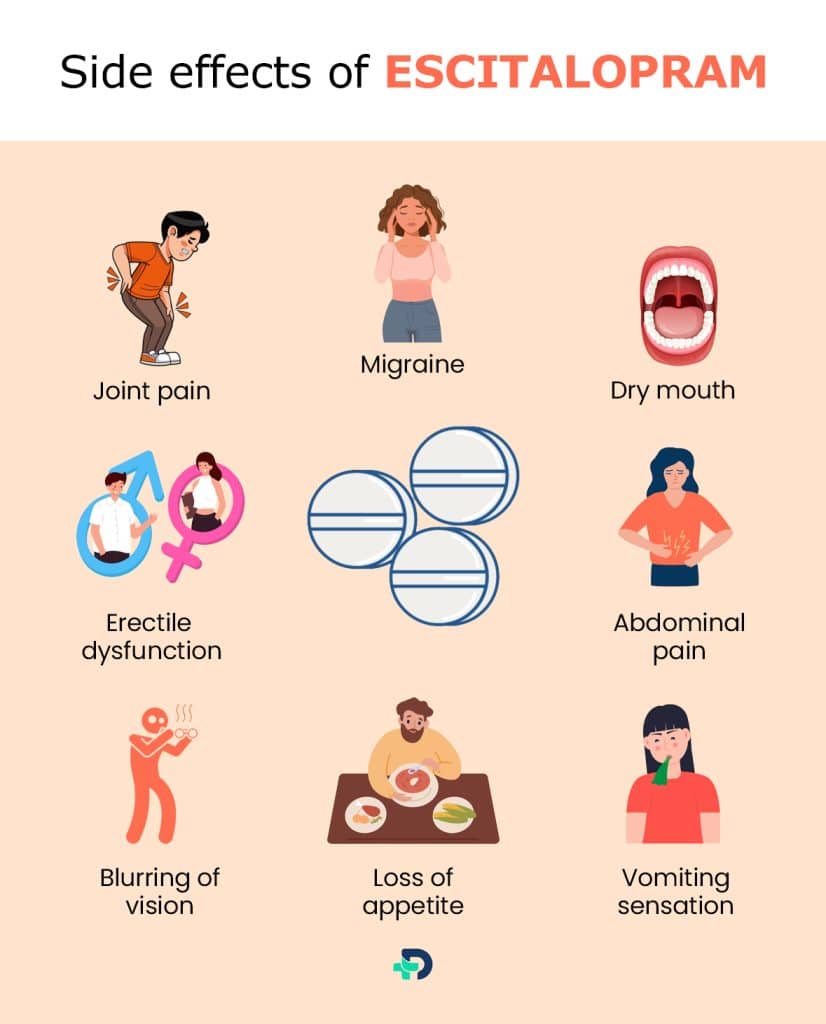
Escitalopram side effects
Specific adverse effects related to escitalopram are:
Serotonin syndrome
- When SSRI and MAO inhibitors are taken together, there is drastic increase in the serotonin level, this raised levels causes agitation, hallucinations, fever, sweating, shivering, fast heartbeat, stiffness of the muscles, jerking, loss of coordination, nausea, vomiting, or diarrhoea, you should seek medical assistance right once.
Clinical Decline and Risk of Suicide
- The emergence of anxious, panic attacks, sleeplessness, irritability, becoming hostile or aggressive, impulsive, hypomania, mania(over elevated mood), other changes in behavior, negative impact of depression, and suicidal thoughts should be noted by patients, their families, particularly early during antidepressant treatment and when the dose is increased.4Side effects| Researched based study from Mayoclinic.org
Other Side effects include:
- Migraine
- Vomiting sensation
- Dry mouth
- Decreased sexual desire (loss of libido).
- Erectile dysfunction
- Somnolence
- Ecchymosis, due to inhibition of platelet function.
Rare Side effects include:
- Abdominal pain
- Unusual bleeding
- Blurring of vision
- Loss of appetite
- Stiffness in the jaw
- Joint pain
- Menstrual abnormalities.
Long term side effects include:
- Some people may experience negative affects on their sexual drive or difficulty getting an erection.
- In certain instances, they may continue even after the medication is stopped. If you are concerned, talk to your doctor.4Side effects| Researched based study from Mayoclinic.org
Precautions
Precautions to be taken by caretaker
- Patients’ families and caretakers should be instructed to watch for the onset of these symptoms on a daily basis because changes may come suddenly.
- If such symptoms are severe, suddenly appear, or were not among the patient’s presenting symptoms, they should be reported to the patient’s prescriber or healthcare provider.
- These symptoms could be linked to an elevated risk.
- These signs suggest the need for extreme monitoring and even medication modifications because they may be linked to an elevated risk for suicide thoughts and actions.
Contraindications
Contraindications
- If you have epilepsy or are receiving electroconvulsive therapy, or if you have ever experienced a reaction of any kind to escitalopram or any other medication, escitalopram can raise your risk of having a seizure.
- If you have a heart condition, escitalopram may cause your heartbeat to become irregular or cause your heart to beat more quickly.
- Have ever had your blood tested for low salt levels are attempting to get pregnant, are pregnant, or are nursing a baby and have glaucoma because escitalopram can make your eye more pressure
In Pregnancy
- If the advantages outweigh the hazards, use escitalopram with caution during pregnancy.
- Escitalopram use in the third trimester after the baby is delivered is linked to problems, which may necessitate prolonged hospitalization, breathing assistance, and tube feeding.
- Escitalopram is secreted in breast milk; weigh the benefits vs risks before using while nursing.5Contraindications| Researched based study from Nhs.uk
Toxicity
Overdose toxicity
- CNS effects (dizziness, seizures, coma, somnolence), gastrointestinal discomfort (nausea, purging), and/or cardiac abnormalities (hypertension, tachycardia, ECG alterations) are a few examples of overdose symptoms.
- Escitalopram overdose has no specific antidote.
- Monitoring for cardiac irregularities and changes in vital signs as well as appropriate therapy with supportive measures should be the main goals of managing an overdose.
- Forced diuresis, dialysis, and other approaches to removing the drug from plasma are unlikely to be helpful because escitalopram is extensively dispersed into tissue after consumption.
- The doctor ought to think about contacting a poison control center for more advice on how to handle any overdose.
Interactions
Escitalopram interactions
Drug interactions
Compared to the other SSRI drugs Escitalopram has the least drug interactions.
- Before taking an NSAID, such as aspirin, ibuprofen, naproxen,coxibs, diclofenac,indomethacin and others, you could easily bruise or bleed.6Interactions| Researched based study from Drugs.com
Consult your doctor:
- When combined with other drowsy-inducing medications, escitalopram can exacerbate this effect.
- Before taking an opioid, a sleeping pill, a muscle relaxant, a blood thinner like warfarin, or medication for epilepsy or nervousness, consult your doctor.
- MAOIs, other antidepressants, and St. John’s wort all interact with escitalopram.
- Pimozide interact with it and serious issues include severe bleeding, serotonin syndrome, and irregular cardiac rhythms are made more likely by these interactions.
- Your medical team can assist you in avoiding and limiting potential escitalopram interactions if you provide a complete prescription list.
Drug food interaction
- Eliminate the alcohol. It is best to avoid consuming alcohol while taking escitalopram.
- Food has no impact on absorption.
Storage
Escitalopram storage
To prevent freezing, the medication needs to be stored at room temperature in a closed container that is shielded from heat, moisture, and strong light.
- Keep out of child’s reach.
- Do not store expired medications.
Takeaway
Takeaway
Escitalopram, the active ingredient of Lexapro, is a drug used to treat depression and generalized anxiety disorder. It falls into the SSRI class of drugs. Risk of suicide, serotonin syndrome and weight gain are most spoken side effects with escitalopram.
Avoid taking escitalopram and NSAIDS together, as they may lead to bleeding. Alter the dose only if advised by your psychiatrist.
Any feedback on this article?
 This Articles content was accurate
This Articles content was accurate Very Informative Article
Very Informative Article I have a question or a comment
I have a question or a comment
 This article contains inaccurate content
This article contains inaccurate content This article was not helpful
This article was not helpful I have a question or a comment
I have a question or a comment
We appreciate your helpful feedback!
Checkout our social pages
References
-
National Library of Medicine
Escitalopram | Overview
-
Electronic Medicines Compendium
Escitalopram | Uses
-
Medline Plus
Escitalopram | Dosage
-
Mayo Clinic
Escitalopram (Oral Route) | Side effects
-
National Health Service
Who can and cannot take escitalopram | Contraindications
-
Drugs.com
Escitalopram Interactions | Interactions













